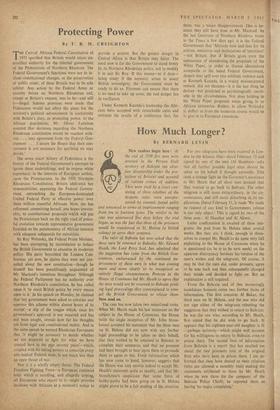Protecting Power
By T. R. M. CREIGHTON
THE Central African Federal Constitution of 1953 specified that Britain would retain un- qualified authority for the internal government of the Protectorate of Northern Rhodesia. The Federal Government's functions were not to in-
clude constitutional changes, or the preservation of public order; of these Britain was to be sole arbiter. Any action by the Federal Army or security forces on Northern Rhodesian soil, except at Britain's request, was to be—and still is—illegal. Solemn promises were made that Federation would not affect the plans for the territory's political advancement in conformity with Britain's duty, as protecting power, to the African population; Mr. Oliver Lyttelton asserted that decisions regarding the Northern
Rhodesian constitution would be reached with- out . . . 'any agreement from the Federal Gov- ernment . . . I assure the House that their con- currence is not necessary for anything we may decide.'
The seven years' history of Federation is the history of the Federal Government's attempts to ignore these undertakings, and to impose white supremacy, in the interests of European settlers, upon the Protectorates. In the 1958 Northern Rhodesian Constitution, Britain abdicated her responsibilities, appeasing the Federal Govern- ment, entrenching the European-dominated United Federal Party in effective power over three million resentful Africans. Now, she has reformed; committing herself, one hopes irrevoc- ably, to constitutional proposals which will put the Protectorate back on the right road of peace- ful evolution towards representative government founded on the paramountcy of African interests with adequate safeguards for minorities.
Sir Roy Welensky, the Federal Prime Minister, has been attempting by intimidation to induce the British Government to abandon its moderate policy. His party boycotted the London Con- ference; yet now, he claims they were not con- sulted about the new constitution—though he himself has been punctiliously acquainted of Mr. Macleod's intentions throughout. Although the Federal Parliament has no authority over Northern Rhodesia's constitution, he has called upon it 'to resist British policy by every means open to it.' In his speech on Monday, he claimed
that 'my government were asked to consider and approve this scheme within almost hours of its
receipt'—a slip of the tongue which, since his government's approval is not required and has not been sought, reveals how far his thoughts are from legal and constitutional reality. And in the same speech he warned Rhodesian Europeans that 'it might be necessary to decide whether we are prepared to fight for what we have created here in the past seventy years'—which, coupled with his taking powers to conscript every able-bodied Federal male, is not much less than an open threat of war.
Nor is it a wholly empty threat. The Federal Freedom Fighting Force--a European extremist body which is enrolling, and allegedly arming, all Europeans who report to it—might provoke incidents with Africans at a moment's notice to provide a pretext. But the greater danger in Central Africa is that Britain may falter. The need now is for the Government to stand firmly by its Northern Rhodesian policy, not to modify it to suit Sir Roy. If this means—as it does— being ready if the necessity arises to assert British sovereignty, the Government must be ready to do so. Firmness can ensure that there is no need to take up arms; the real danger lies in vacillation.
Under Kenneth Kaunda's leadership the Afri- cans have accepted with remarkable calm and restraint the results of a conference that, for
them, was a major disappointment. This is be- cause they still have trust in-Mr. Macleod. As the last Governor of Northern Rhodesia wrote to the Times a few days ago, it is the Federal Government that 'Africans hate and feat for its actions, omissions and declarations of intentions' — not Britain. But if Britain gives even the appearance of abandoning the proposals of the White Paper, in order to discuss alternatives acceptable to the hated Federal Government, despair may spill over into nihilistic violence such as Kenneth Kaunda, in a widely misinterpreted remark did not threaten—it is the last thing he desires---but predicted as psychologically inevit- able in the circumstances. Nor does holding to the White Paper proposals mean giving in to African extremists. Rather, to allow Welensky to deflect us from the moderate course would be to give in to European extremists.






































 Previous page
Previous page